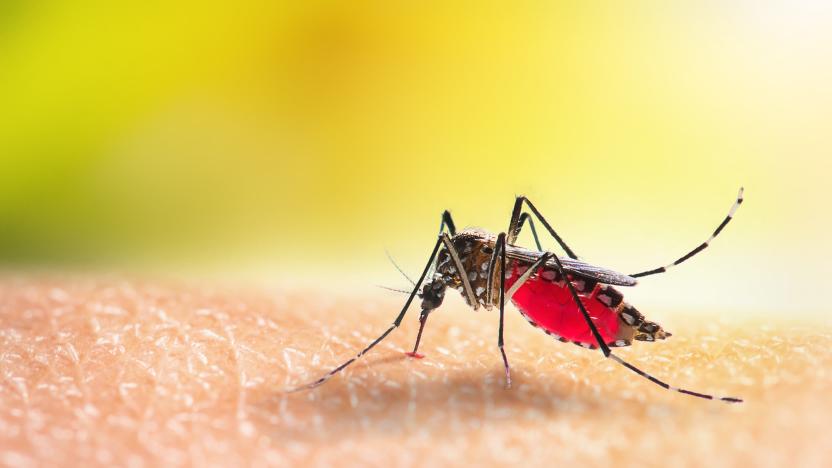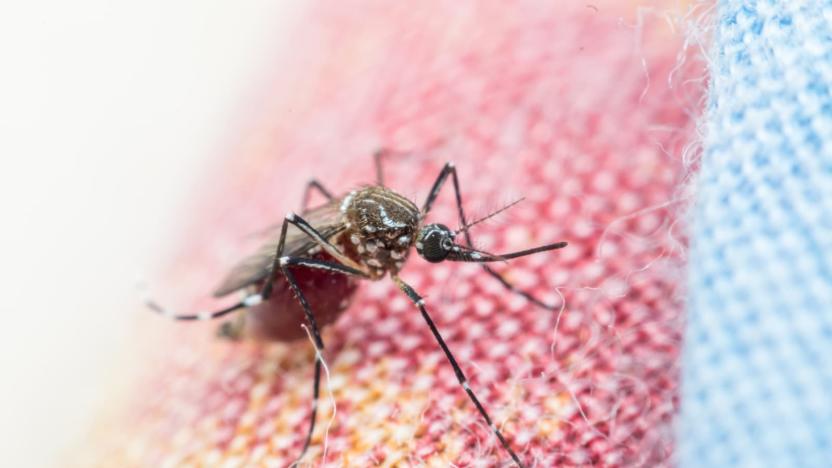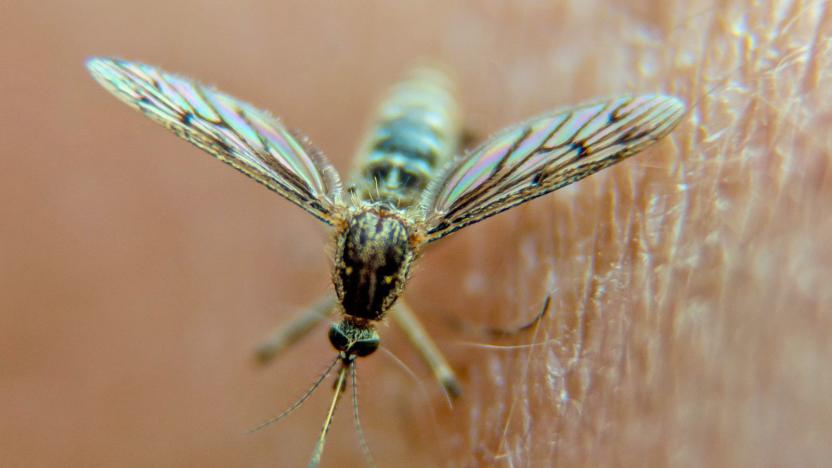malaria
Latest

WHO approves the world's first malaria vaccine
In a landmark announcement today, the World Health Organization has recommended the use of the first-ever malaria vaccine.

Moderna enters clinical trials for its mRNA-based flu vaccine
Moderna has injected its mRNA-derived vaccine for the seasonal flu into a human volunteer for the first time as part of a Phase 1/2 clinical study, the company announced on Wednesday.

The mRNA tech we used against COVID could help us finally beat malaria
As vaccination rates for the current pandemic continue to climb, the medical community is looking ahead to turn this powerful genomic weapon against myriad other deadly diseases.

AI-powered robot finds common soap ingredient may combat malaria
Around half of the world's population is at risk of contracting malaria and it causes around half a million deaths each year. However, the parasites that cause malaria are becoming more resistant to the drugs we currently use to combat them, meaning the global malaria risk stands to increase if we don't develop new drugs quickly enough. Well new research published recently in Scientific Reports finds that a common chemical used in everything from soap and toothpaste to clothing and furniture might be an effective treatment, and it was done with the help of AI.

Drones and smartphones help fight malaria in Tanzania
The fight against malaria has been improving, but there's still lots more work to do. For one thing, anti-larval sprays are both expensive and time-consuming -- you can't always afford to spray an entire area. Thankfully, a mix of technology is making that mosquito battle more practical. Wales' Aberystwyth University and Tanzania's Zanzibar Malaria Elimination Programme have partnered on an initiative that uses drones to survey malaria hot zones and identify the water-laden areas where malaria-carrying mosquitoes are likely to breed.

Satellites help predict malaria outbreaks months in advance
Malaria is one of the greatest health threats in tropical regions like the Amazon, but predicting its spread is difficult. While it's no secret that mosquitoes prefer warm air and standing pools of water, how do you translate that awareness to a large scale? By getting a little help from orbit, apparently. Researchers are using data from NASA satellites (such as the Landsat series) to predict malaria outbreaks by identifying areas where the soil moisture creates prime breeding grounds for the mosquitoes that transmit malaria. They know that floods and deforestation tend to create mosquito-friendly pools of water -- compare that with fine-grained models of human behavior (say, loggers or miners who work in wet conditions) and you have a unified system that can anticipate outbreaks about 3 months in advance, right down to individual households.

Mosquitos are beating gene editing with rapid evolution
Gene editing and gene drives have the potential to be a massive scientific breakthrough, letting scientists target and eliminate diseases by modifying genes and disseminating them throughout a population. But it's also a technique that's not ready for prime time: There's a lot of work to be done to quiet critics and ensure that releasing gene-edited organisms into the wild will have the desired effect.

President Obama wants US to 'reignite its spirit of innovation'
President Obama gave his final State of the Union address on Tuesday. In it, he discussed how far the country has come over the last year and where he sees it going in the future. But beyond the expected talk of a rebuilt, stronger economy, soaring high school graduation rates and new civil liberties, he laid out a bold plan to, as he puts it, make "technology work for us, and not against us."

'Gene drive' mosquitoes could end malaria once and for all
The scourge of malaria could be going away for good in some regions, thanks to a groundbreaking discovery by researchers at the Universities of California, Irvine and San Diego. Their study, published Monday in the journal PNAS, has reportedly uncovered a method that all but guarantees that specific gene sets will be passed to offspring.

Eve the robot scientist discovers new drug candidate for malaria
Meet Eve: she's darn smart, can make the process of finding new drugs a lot faster and cheaper -- and she costs around $1 million. That's because Eve is a robotic scientist developed by researchers from the Universities of Aberystwyth and Cambridge, the same team who created her predecessor (you guessed it) Adam back in 2009. Since Eve was created specifically to automate the early stages of drug design, she's capable of scanning over 10,000 compounds a day, whereas humans obviously wouldn't be able to process as many in the same timeframe. As Professor Ross King from the University of Manchester (which Eve calls home) said: "Every industry now benefits from automation and science is no exception. Bringing in machine learning to make this process intelligent -- rather than just a 'brute force' approach -- could greatly speed up scientific progress and potentially reap huge rewards."

Hand-held malaria tester sequences DNA, suggests meds quickly
Despite how far we've come with technology, malaria is still a serious threat for huge chunks of the developing world. A prototype tool from UK-outfit QuantuMDx, however, could help stave off mosquito-related deaths by giving health-workers the power to diagnose the disease in 10 - 15 minutes. As the team tells it, typical DNA sequencing can take days, weeks or even months, but its "lab on a chip" can rapidly diagnose a disease and accurately predict which drug and what dosage to administer -- all based on the parasite's genetic code. That last bit is key because malaria has a nasty habit of being resistant to medications.

TED Talks mischief: lasers killing mosquitoes by the hundreds
Malaria is a huge problem worldwide, so it's no surprise to anyone that plenty of people spend lots of time trying to think of ways to rid the world of mosquitoes, prime movers of the disease. Nathan Myhrvold's company Intellectual Ventures Labs (and former chief technology officer at Microsoft) is focusing on just that. Using widely available and common electronics parts, Intellectual Ventures has made lasers which can kill mosquitoes mid-flight -- at a rate of about 50 to 100 per second. Myhrvold first publicly demonstrated this laser (which is made of parts of printers, digital cameras, and projectors) at the TED conference the other day, using hundreds of mosquitoes in a clear glass case to make his point. The laser's software determines the size and shape of the target before deciding whether or not to shoot, so, for instance -- it wouldn't take aim at a person or a bumblebee. The lasers could be used to protect hospitals and clinics in areas with high mosquito populations and in areas with a high rate of malaria infestation. Now, this is surprisingly not the first time we've seen such a trick -- though it is the first time we've seen video evidence of it working. There are some insanely informative (and murderous) videos at the source link. Be sure to check them out. Update: Video is after the break.

Scientists shoot down malaria-carrying mosquitoes with frickin' lasers
Seriously, is there anything a laser can't do? A team of mad scientists in Washington have concocted a system that could essentially eliminate malaria-carrying mosquitoes with lasers, and the whole thing can be built from parts sourced on eBay. The so-called mosquito laser is credited to an idea from Lowell Wood, an astrophysicist who worked with Edward Teller, the "architect of the original plan to use lasers to shield America from the rain of Soviet nuclear arms." In theory, at least, the technology could one day be used to draw a laser barrier of sorts around a village. Of course, the trick is to make the lasers powerful enough to smoke the bugs without harming humans -- any of you Earthlings up for a clinical trial or two?[Via eHow]

NASA helps predict, prevent disease outbreaks
We could almost swear we've heard this same scenario played out in a 80s era sci-fi drama, but apparently, this ain't out of any movie script. By utilizing 14 orbiting satellites and enlisting the assistance of NASA's Applied Sciences Program, scientists are reportedly observing our planet's environment to "help predict and prevent infectious disease outbreaks around the world." Apparently, the satellites collect environmental change data, which is then forwarded on to the Centers for Disease Control and Prevention and the Department of Defense and broken down to estimate and track epidemics. The remote sensing technology is currently be used to target and track malaria (among other things), and NASA surveillance systems can also be used to determine if a given outbreak was caused by "natural circumstances" or if bioterrorism was to blame. Phew, at least we know 28 Days Later won't become an infamous example of life imitating art... right?[Via Slashdot]







